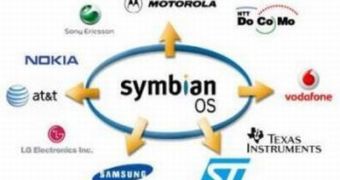Symbian, ranked as the most popular smartphone operating system, plans to maintain its lead in the rapid increasingly market by making its software more accessible for both users and developers, and most of you might already know a few things about Symbian's release plan. Due to the entrance of new companies like Apple and Google on the market, Britain's Symbian has lost market share in the past few years.
David Wood, one of the representatives of Symbian Foundation, said that he expected to stop this trend. "Symbian has a great chance to retain the leading position. We should have the ability to keep 50 percent of the smartphone space," Wood informed Reuters in an interview. "The focus in the short term is on building a vibrant community, to make developers really satisfied."
The foundation predicts that, in about 3-4 years, one billion devices will be using its operating system, given the fact that in February this year Symbian was functioning in over 250 million mobile phones. Even with the decrease of the mobile phone market, analysts forecast that the smartphone market will grow with approximately 30 percent in the near future, since phones with advanced capabilities, e-mail or Internet are in high demand.
With all of the major companies shifting their attention from hardware to software, the competition has increased. "The operating system market today is crowded, probably too crowded. Everybody sees the potential of this space," Wood said. Android, the operating system manufactured by Google, has won some terrain in the mobile industry but other Linux-based operating systems are aiming for higher positions in the market led by Symbian, Apple, Research in Motion and Microsoft.
Until now, 150 companies have joined the Symbian Foundation and 50 more are expected to join in the near future. Nokia bought Symbian's shareholders last year and decided to hand over all its software to an independent organization that would develop it on an open-source basis, so all the members will be able to use it freely and adapt the code. "The move to open source is a key part to lower the barrier to entry," Wood said.
The list includes the Chinese handset maker Huawei and its rival ZTE, both companies known for their aggressive pricing tactics used to win market share. Partnering with Chinese vendors might boost smartphone sales, which were put on hold due to their high prices. The only operating system used in Nokia smartphones so far is Symbian, yet the company also launched an Internet Tablet, Nokia N900, which is based on Maemo.

 14 DAY TRIAL //
14 DAY TRIAL //